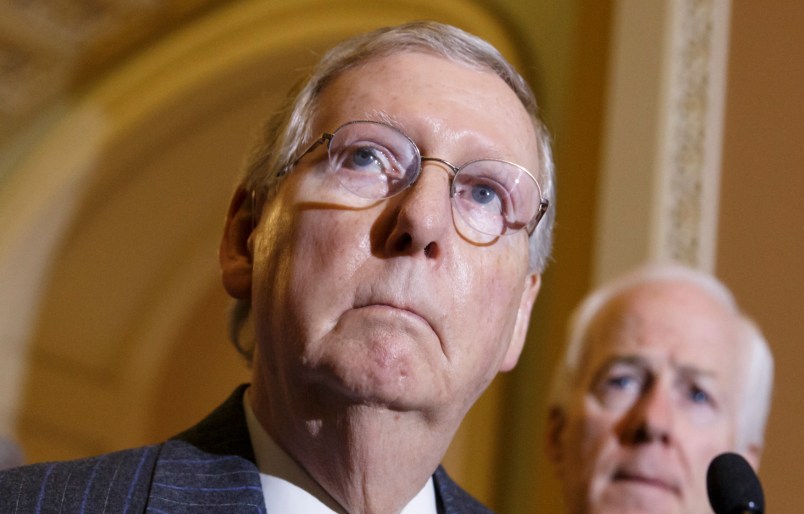The latest effort by Congressional Republicans to repeal Obamacare is hitting all sorts of speed bumps, as the Senate GOP is in disagreement as to how far to go, even though their bill stands no chance of being signed by President Obama.
The inability of Senate Republicans to settle on a plan reflects yet again how challenging repealing Obamacare would be, both in terms of policy and politics. It also exposes the gap between the GOP’s anti-Obamacare political rhetoric, and the political and practical realities. Further complicating the issue is an attached measure to defund Planned Parenthood, that is also putting in a difficult spot some moderates facing tough re-election bids.
The Senate is currently considering its next steps in advancing a repeal bill through the so-called budget reconciliation process, a complex maneuver that requires only 51 votes and thus would be free of a Democratic filibuster threat. The House passed its version last month which would only repeal some aspects of Obamacare, mainly the employer and individual mandates.
Some Senate Republicans — namely those running for president — immediately called for a bill that went farther, while others began pushing back at the idea of putting some Obamacare subsidy programs, such as Medicaid expansion, on the chopping block.
Tuesday night the Senate parliamentarian approved one budget reconciliation plan. (A bill that uses reconciliation must meet certain requirements, including a mandate that it reduces the deficit.) The pressure is now on for GOP leadership to find a way to thread the needle between Republicans wanting a broader repeal and those who want to leave popular aspects of the law untouched.
Soon after the House bill passed, Sens. Mike Lee (R-UT), Ted Cruz (R-TX) and Marco Rubio (R-FL) said they would oppose a bill that didn’t fully repeal Obamacare, a stance Heritage Action — the lobbying arm of the Heritage Foundation, the conservative think thank that ironically developed many of the early policy proposals that later became the basis for Obamacare — also supports. (Kentucky Sen. Rand Paul, the other GOP2016er, has also said he prefers a full repeal.)
And earlier this week, Senate Republicans talked a big game of going farther than the House.
“The House guys are going to be surprised when they learn they were outflanked by the Senate, which will pass a more conservative Obamacare repeal,” said a Senate GOP aide told The Hill.
Now some Republicans are now saying, not so fast — particularly those in red states that have expanded Medicaid.
“I am very concerned about the 160,000 people who had Medicaid expansion in my state. I have difficulty with that being included,” said Sen. Shelley Moore Capito (R-WV), according to The Hill. Another unnamed GOP lawmaker told The Hill that including a Medicaid expansion repeal would be “too problematic.”
Additionally Republicans want to use budget reconciliation to defund Planned Parenthood, which is also getting some pushback from moderates.
Sen. Lisa Murkowski (R-AK) called the provision a “big issue,” according to Politico. A vote in September to advance a defund Planned Parenthood measure notably fell short of even a majority of the Senate.
All the moving parts are putting in jeopardy getting the 51 votes necessary to advance the measure through reconciliation.
Even if Senate Republicans manage to advance a repeal measure, it faces a sure veto by the White House. The idea behind pursuing the ultimately doomed effort is for GOP lawmakers to show conservatives they will have a roadmap to repeal the law once a Republican (they hope) is in the White House to sign it.
Nevertheless some lawmakers are expressing a desire to abandon full-scale repeal altogether, and would rather focus in on nixing the unpopular but non-critical aspects of the law — namely the “Cadillac” tax and the medical device tax — for which they could get Democratic support.
“I want to make policy, not a political point,” an unnamed GOP senator told The Hill.











Local GOPers, who for SOME weird reason are still convinced I am a Republican, are almost purple with fury when they talk about Obamacare but they go pale when the prospect of repealing it comes up and start making all kinds of excuses. That is because Obamacare has become Social Security Mark II; in other words, INSTANT DEATH if you touch it.
I’ll never understand why these thugs feel the need to make a career out of hating humanity.
They are simply catering to their like minded supporters/donors.
Voting on leislation to repeal the Affordable Care Act is now cattorgized as a mental illness. It meets thesymptom requirements perfectly. Repeatedly doing the same thing over and over again but expecting a different outcome. Time to put them in a mental institution. Oh wait, we can’t, Ronald Reagan changed the rules and closed most of the mental hospitals first in California as govenor and then across the country as president.
Maybe this mesmerization therapy will help them come up with something…